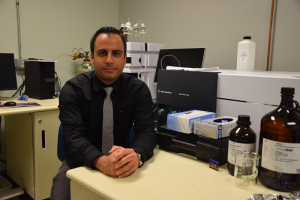Ali Ansari’s Research Focuses on Improving Clean Water Output from RO Desalination
Ali Ansari, a doctoral student at the UH Cullen College of Engineering, was recently awarded the American Society of Civil Engineers’ John B. Hawley Memorial Fellowship. The fellowship, established in 1961, promotes graduate study and research in hydraulic and environmental engineering.
Growing up in Tehran, Iran, Ansari experienced water rationing and scheduled electricity blackouts. This motivated him to find solutions to environmental issues and led him to pursue his Ph.D. in civil and environmental engineering.
“Considering the environment is vital for sustainable development,” Ansari said. “I have always wanted to work with microorganisms; to understand their role in environmental issues and apply their endless potential to solve those issues.”
The one issue close to his heart is the availability of clean water.
Worldwide population growth has fueled industrialization and pollution, which in turn have caused a water crisis for 1.2 billion people and the situation is worsening, Ansari said. The number of affected peopled is projected to rise to 3.9 billion in the next decade according to the World Water Council, he pointed out.
“With a small amount of freshwater available, desalination is one of the most promising technologies to provide an infinite, uninterruptable, and reliable source of clean water,” Ansari said.
Working under the guidance of Debora Rodrigues, an associate professor known for her expertise in environmental biotechnology, Ansari’s research focuses on understanding the complex physical-chemical-biological interactions in the reverse osmosis (RO) systems that are a part of large-scale desalination systems around the world. RO membrane can work with different water sources, including seawater, brackish water, and wastewater to produce fresh, drinkable water.
But such membranes still suffer from low recovery for seawater desalination, relatively small removal of low-molecular-weight contaminants, reactivity to chlorine and fouling.
Membrane fouling by inorganic materials (scaling) and microorganisms (biofouling) have been the subject of many studies since membrane fouling will decrease clean water production levels, increase energy consumption due to clogging of the membrane pores and potentially damage equipment. It adds unnecessary expenses to the desalination facilities’ bottom line.
Conventionally, researchers always address the scaling and biofouling separately, Ansari said. For instance, when proposing methods to prevent scaling, researchers only consider water chemistry. However, the condition favorable for scale formation could be provided by the metabolic activity of the microorganisms via different mechanisms.
His aim is to simultaneously prevent scaling and biofouling on RO membranes to boost clean water production.
“The main goal of my research is to understand how the chemical and biological properties of the feed solution into a desalination system will interact with each other and affect membrane fouling, i.e. scaling and biofouling on reverse osmosis membranes,” Ansari said. “By understanding the fundamentals of the interaction between the biological and chemical components, I hope to pave the way to develop desalination systems with less fouling and more water recovery.”
In addition to his research, Ansari has also led an undergraduate team in the 2017 Campus Rainworks Challenge, which is the U.S. Environmental Protection Agency’s annual national competition to engage college students in the design of on-campus green infrastructures to address stormwater pollution. His team built a biosand filter and was a finalist.
Ansari received his bachelor’s degree from the Isfahan University of Technology (IUT) in Isfahan, Iran and a master’s degree in chemical engineering, with a focus on energy and environment, from University of Tehran (UT) in Tehran, Iran.
While at the University of Tehran, Ansari worked as a water treatment expert with the United Nations Educational, Scientific and Cultural Organization (UNESCO) Chair on Water Reuse. UNESCO’s water-related chair positions are established teaching or research positions at universities and research institutes around the world.
